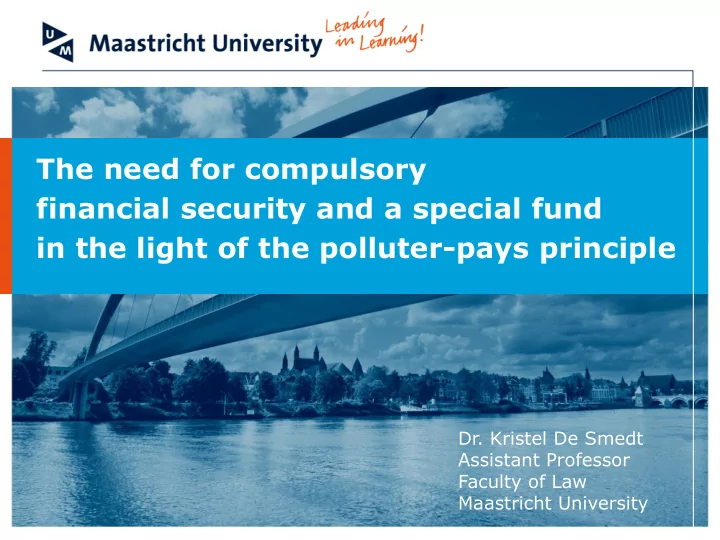

The need for compulsory financial security and a special fund in the light of the polluter-pays principle Dr. Kristel De Smedt Assistant Professor Faculty of Law Maastricht University
The economic analysis of law • Examines how individuals would respond to changes in law and under which circumstances a particular rule would maximise social welfare. • Environmental damage = externality • Tort law = means to internalise the externality • Negligence versus strict liability • Preference for strict liability for dangerous activities that may cause environmental damage Faculty name 2
Strict liability versus negligence for dangerous activities Strict Negligence liability Faculty name 3
The economic analysis of law Therefore: • A strict liability regime will only give optimal incentives for prevention if the insolvency risk can be removed. • From a theoretical perspective, a strict liability regime should not be introduced without financial guarantees as an insolvency risk might arise and hence restoration of the environmental damage cannot be ensured. Faculty name 4
The ELD provisions on financial security and their rational • In 2004, environmental NGO’s were in favour of mandatory financial security, MS were split over the issue and the EU Commission was against but proposed to leave the issue to the MS. • In 2004, there was a lack of a market for financial securities for environmental damage. • This background resulted in a modest practical solution: Art . 14 ELD: ‘ Member States shall take measures to encourage the development of financial security instruments … to enable operators to use financial guarantees to cover their responsibilities ’ . The ELD does not further specify the kind and intensity of the required ‘ encouragement ’. Faculty name 5
Approaches adopted by the Member States • Member States have adopted different approaches, from information campaigns to laws imposing financial guarantees. • 8 Member States (Bulgaria, Portugal, Spain, Greece, Hungary, Slovakia, Czech Republic and Romania) decided to set up mandatory financial security schemes at national level, while the other Member States preferred a voluntary markets approach. • In Member States that adopted mandatory financial security the thresholds for triggering the security requirement and the amounts of the security (including ceilings and floors) required vary and distinct exceptions or exemptions are applied. • It is too early to tell which of these approaches is the most efficient (and there may be no EU-wide most efficient solution). Faculty name 6
Harmonised mandatory financial security? • The Commission reviewed the situation in 2010 (Art 14(2)), but (due to late transposition) considered it to early to propose a harmonised mandatory financial security. • ELD Refit Evaluation of 14 April 2016: the case for the introduction of a harmonised financial security (insurance) instrument at the EU-level is still weak. – recent developments showing a steady upward trend in the offer of insurance nearly across the whole EU. – It is widely believed that tailor-made solutions at national level are at present the better option. – BUT: problems of large scale accidents and insolvent operators who cannot bear the costs of remediation persist Faculty name 7
Harmonised mandatory financial security? However: • Art 12(2) Shale Gas Recommendation: Member States should ensure that operators provide a financial guarantee or equivalent covering permit provisions and potential liabilities for environmental damage prior to start of operations. • Offshore Safety Directive: similar provision. Missed opportunity to incorporate such an obligation in the ELD as well? Faculty name 8
The insolvency risk: a reality Just a few: • Kolontár, Hungary, 4 October 2010: Hungarian Government spent approx. EUR 128 million. This amount, which was mainly borne by Hungarian taxpayers, compared to EUR 40,000 in financial security held by the operator. • Moerdijk (Chemie-Pack) accident in the Netherlands, 5 January 2011: financial security was inadequate and local governments recovered only a small amount of the EUR 50 million remedial costs. Faculty name 9
The insolvency risk: a reality Thus: • Remediation of environmental damage can be extraordinarily costly. • Therefore, the insolvency risk is real, especially in large scale accidents. • Once again: A strict liability regime for dangerous activities should not be introduced without financial guarantees. Effectiveness of the ELD could be enhanced in those cases where the operator would otherwise not be able to fund restoration = polluter pays principle can be ensured. Faculty name 10
Financial security instruments – Insurance • In most EU Member States, the environmental damage insurance market is relatively young and still developing.The main barrier is the lack of establised risk assessment and valuation benchmarks. • Development of insurance depends on predictability of ELD application to actual cases. • Insurers/financial institutions will not accept an unlimited risk; there will necessarily be a maximum amount covered by the financial security instrument. • Adverse selection/moral hazard : caps, exclusions or other terms and conditions. – Bank guarantees – Self-insurance and risk pooling – Special Fund – Piercing the corporate veil? Faculty name 11
Mandatory financial security: questions raised Mandatory financial security raises a series of issues: • Which operators, in what amounts? • Which instruments qualify? • Which coverage terms and conditions are acceptable? • Exemptions (EMAS)? Faculty name 12
Mandatory financial security: evaluation and conclusion • The absence of mandatory financial security creates a risk of under-deterrence because an operator exposed to strict liability for damage amounts exceeding its assets would take less than optimal care • In theory, mandatory financial security would ensure that the polluter would be able to pay for the restoration costs and that the polluter pays principle is fulfilled. • In practice, a balance between costs and benefits of full protection against any potential inability to compensate damage might have be found. Faculty name 13
Thank you Dr. Kristel De Smedt
Recommend
More recommend